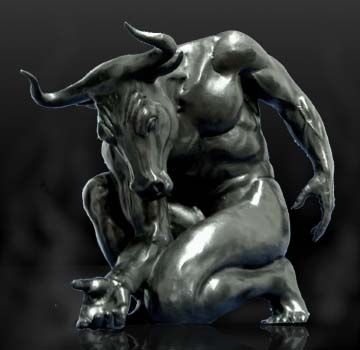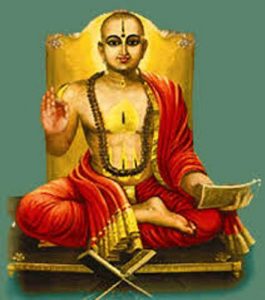When people talk about the ancient mythological creature Minotaur, a ferocious beast immediately comes to mind and perhaps the infamous myth of the labyrinth as well. What people may not know, though, are the interesting details of the events that lead up to the birth of the mighty Minotaur. What is universally recognized as a feared creature of unusual birth was actually created from unfortunate actions between a selfish king and a vengeful god.
King Minos and his wife Queen Pasiphae led a good life ruling over the island of Crete. Minos held power over multiple islands of Greece and was recognized for his success and power by many. In an attempt to prove his rightful claim as King of Crete, Minos had sworn to locate the best bull he could find among his cattle, one that would be very favorable to its intended receiver. Minos would then take this great bull and sacrifice it to Poseidon, god of the seas, as he did each year in order to secure his ownership of the throne. One year in particular, among King Minos’ herd, there birthed a magnificent bull, one that possessed a unique kind of beauty that King Minos had never seen before. Minos truly was in awe of this magnificent bull, so much so that he found himself captivated by its beauty, and he realized that this bull was something he did not want to give up to the promised Poseidon. In fact, Minos purposefully chose to overlook the magnificent bull when making his decision, and settled on a less attractive bull to sacrifice to Poseidon.1

Watching him and his deceitful actions very closely, Poseidon took notice of King Minos’ plan in sacrificing a lesser bull to keep the best for himself. This made Poseidon very angry, and he immediately began thinking about how to discipline Minos for his selfishness. Poseidon saw that Minos loved his wife Pasiphae immensely, and with this knowledge, constructed a plan that would leave Minos and Pasiphae in the presence of a monster. 2
Poseidon cast a curse upon Queen Pasiphae, one of love, which she could not escape. Her love was not for her husband; instead, she felt love for his magnificent bull. Pasiphae would be found swooning over the magnificent bull as if it were a handsome and powerful man ready to take her into his strong arms. Alas, she was so utterly infatuated with the magnificent bull that she constructed a plan to lure the bull towards her, and hopefully lay with her romantically.3
Queen Pasiphae instructed a craftsman of the island, Daedalus, and his son, Icarus, to build her a wooden structure that represented a near-perfect body form of a female bull. She insisted that the piece be built as realistically as possible and large enough for herself to comfortably fit inside without revealing that she was human. In spite of her odd orders, Daedalus and Icarus did what the Queen asked of them. As a finishing touch, Queen Pasiphae placed a large cow hide over the structure so that the magnificent bull would notice the structure and take it as a female looking to mate. The Queen rolled the structure out to the field where she would often see the magnificent bull grazing day after day. She strategically placed herself in the view of the magnificent bull, stepped inside the structure, and waited patiently for the bull’s approach.4

After grazing for a bit, the magnificent bull caught sight of what it thought was the beautiful female and approached it. Before long, the Queen’s plan worked, as the magnificent bull fastened itself upon her and together, engaged in sexual and intimate relations. As a result of this, Queen Pasiphae became pregnant with the baby of the bull and upon its birth realized she was carrying something horrific inside of her.5
Just as Poseidon intended, Pasiphae had relations with the bull she loved and later birthed an unusual creature, born half-bull, half-human to be known as the Minotaur.

The creation and birth of the Minotaur, as well as other monsters, typically is done in response to acts of sin. In this particular case, King Minos’ egotistical actions led him to break a promise made to a god, and in return, that god made Minos’ wife feel the same love that her husband did for the magnificent bull, giving in to her abnormal fascination and eventually birthing an infamous monster of ancient Greece.6
- UXL Encyclopedia of World Mythology, 2009, s.v. “Minotaur.” ↵
- UXL Encyclopedia of World Mythology, 2009, s.v. “Minotaur.” ↵
- Christian Moevs, “Centaurs, Spiders and Saints,” in Vertical Readings in Dante’s Comedy: Volume 2, edited by Corbett George and Webb Heather (Cambridge, UK: Open Book Publishers, 2016), 14-17. http://www.jstor.org/stable/j.ctt1sq5vb5.7. ↵
- UXL Encyclopedia of World Mythology, 2009, s.v. “Minotaur.” ↵
- Christian Moevs, “Centaurs, Spiders and Saints,” in Vertical Readings in Dante’s Comedy: Volume 2, edited by Corbett George and Webb Heather (Cambridge, UK: Open Book Publishers, 2016), 14-17. http://www.jstor.org/stable/j.ctt1sq5vb5.7. ↵
- George Palmer Garrett, “The Function of the Pasiphae Myth in Brother to Dragons,” Modern Language Notes 74, no. 4 (1959): 311-13. doi:10.2307/3040070. ↵



134 comments
Jason Garcia
I only knew of The Minotaur because of the labyrinth story I had no idea that his origins would be so much more different than the other creatures in mythology. Although this was a rather weird read I found it interesting to learn about the creature’s birth. Like many other myths, this one had a word of caution and it was no doubt used to warn people of their selfish ways. Very well researched and very well worded!
Isaac Rodriguez
From video games, movies, and books I had heard of the minotaur many times prior to reading this article but I was not aware of its origins. Like many other Greek mythology stories, I found this one, in particular, to be bizarre but interesting. After reading the article I would like to learn more about what happened to the minotaur after his birth.
Kimberly Simmons
I have never inquired about the Minotaur or its origin, but this article so interestingly describes the story of how it came to be. It is quite a strange story, especially the woman’s sexual fascination with the bull. I’m sure Minos was not pleased when he found out that his wife was carrying a creature inside of her. Nevertheless, the article did a great job of briefly explaining the tale.
Iris Henderson
I definitely did not know the full story of the Minotaur, as it seems this is a story that you won’t forget! King Minos’ selfishness offended Poseidon to the point that he cursed his wife with this really absurd infatuation of a bull. One of the most disturbing parts to me was how she and Daedalus created a structure to catfish this bull into having relations with her. Although this is all pretty gross, I found the article to be intriguing and well written.
Natalie Childs
This was a great article. I knew of the Minotaur, but I never really knew the origin of it. On top of all of the great story telling of the origins, I found it really interested that Daedalus and Icarus were in the story and helped build the fake female bull. This myth really shows just how far the God’s would go to punish the mortals that defied them.
Vanessa Tombo
Fascinating article! I have had a few reading about the origin of the Minotaur. I find this article absolutely intriguing and comical at the same time. The king clearly did not see this coming. I often wonder what his exact reaction must have been after he found out his wife was carrying the child of another and his shock after seeing the “baby”. All the same, this was a very interesting article which was also very well written.
Carlos Sandoval
I think Greek Mythology is one of the most interesting of all the other mythologies. I’ve heard the story of the minotaur, but it was the one everyone knows. I never knew more background on the beast like this article displays, it was a very intriguing read, well done. I did not know that the Queen Pasiphae had interactions with the bull like the story tells. There are so many details that are skipped over when the original story is told.
Timothy ODekirk
I am an absolute fan of Greek mythology, and I love the story of the Minotaur. However, I did not know the story to this extent and it was great to learn some more details about this interesting story. The fact that Queen Pasiphae actually engaged sexual relations with the bull astonished me and actually made me laugh. Like, this is so impossible. I guess that ‘s why people call this mythology. I never knew the story about the queen giving birth to the infamous Greek monster, I just knew the story of Minos and his fascination for the Minotaur. This article really opened my interest for this story and many other Greek mythology out there today.
Natalia Carroll-Long
I had no idea this is how the Minotaur was created in Greek mythology. I really wasn’t expecting anything like this. The only thing I knew about the Minotaur was that it was born from sin and that somehow it incorporated a labyrinth. To read that Pasiphae actually wanted to mate with a beautiful bull really too me for a spin. Honestly, although it is bizarre, this fits right in with Greek mythology because when the gods are disrespected, they take revenge…. sometimes not in an orthodox way.
Robert Flores
I have always been very intrigued by greek mythology. This infatuation has led me to read many stories about the greek gods but I never knew the origins of the minotaur until now. The story is very well done. The bestiality is repulsive but so are a lot of things in greek mythology. I wonder if Queen Pasiphae was ever relieved of Poseidon’s curse though.